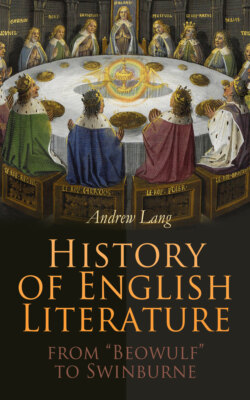Читать книгу History of English Literature from "Beowulf" to Swinburne - Andrew Lang, Robert Kirk - Страница 83
На сайте Литреса книга снята с продажи.
Sir David Lyndsay.
ОглавлениеThe most popular of the old Scottish poets was not so poetical as Henryson, but gave pleasure by his genial character, his extremely coarse humour, and his attacks on the Churchmen and on abuses in the State. This author, Sir David Lyndsay, was born, perhaps at his family place, the Mount, in Fife, about 1490. His name "Da. Lyndsay" (if it be his) appears in the register of St. Andrews University besides that of the man whom he hated so much, and attacked in verse after his murder, the great Cardinal Beaton. By 1511, Lyndsay was a page at Court, and acted in a play at Holyrood. In 1512, Lyndsay was Master of the Household, or chief attendant of the infant Prince, later James V. He was present when the apparition described in "Marmion" gave a warning, in church, to James IV, just before Flodden, and told Lyndsay of Pitscottie, the amusing chronicler, that he tried to arrest the figure "but he vanished away as if he had been a blink of the sun or a whiz of the whirlwind". Till 1522 his chief business was to teach and amuse the boy, James V;
I bore thee in mine arm
Full tenderly,
and, later, told him fairy tales such as the story of the Red Etin, or disguised himself as "the grisly ghost of Guy".
About 1528 Lyndsay wrote "The Dreame" (the usual allegorical dream), in 1529 he was made chief herald, "Lord Lyon King of Arms," and as such went on many foreign embassies. In 1539-1540 his great play, "The Satire of the Three Estates," was acted before the Court; it is the only early Scottish drama that survives. There are two Parts, and three interludes full of matter wonderfully coarse. The play is all in favour of reforms, and is full of the satire of the Churchmen and pleadings for the poor which ensured its popularity. There are some seventy characters, most of them allegorical personages. The King delighted in the satire, and as Lyndsay attacked the vices of the clergy and the Pardoners, not the doctrines of the Church, he ran no risk of martyrdom. The verse is in many forms and different sorts of stanzas, in rhyming couplets of eight syllables, or of ten or more.
After James's death and the murder of Cardinal Beaton, Lyndsay wrote a poem, "The Tragedy of the Cardinal" in which his ghost accuses himself of many sins and crimes, and is sure that Boccaccio would write "my tragedie," if Boccaccio were still alive. Lyndsay died early in 1555. His most popular poem, probably, was a good-humoured romance, "Squire Meldrum," about the fighting adventures, at home and abroad, of a young Fife laird of the period. He wrote many other things, humorous or grave, admonitions to the King, and a reply to a "Flyting" or scolding, of the King against him, in verse; unluckily the Royal lampoon is lost. A Lament for James's first wife who died young; a very humorous set of verses on the King's dog; and a "Dialogue between Experience and a Courtier," with shorter pieces, grave or gay, make up Lyndsay's contribution to the literature of his country. They are full of historical hints, but, merely as poetry, are now seldom read, as Henryson may be read, for pleasure. The Reformation, breaking out in 1559, distracted men's minds from secular literature, to which, for more than a century, Scotland contributed nothing of real importance except the "History of the Reformation" by John Knox, the Reformer. This work is written in such English (not Scots) as Knox could command, for in origin it was meant to be read in England, and to justify the proceedings of the Reformers. It is partly derived from memory of the events and the memory is sometimes strangely inaccurate. Public documents are inserted at full length, in one case with some lack of candour, and actions are denied which, later, were acknowledged. The book, as history, needs to be cautiously studied, but as a picture of the men and women of the age, especially of Knox himself and Queen Mary, it is most vivacious, and may be read with interest and amusement. Knox's other works, theological, epistolary, and political, were written to meet the needs of the moment, and are of little value except to historians and students of the career and character of the author.
1. See proofs by Mr. George Neilson, in Blind Harry's "Wallace," "Essays and Studies," by Members of the English Association, 1910.
